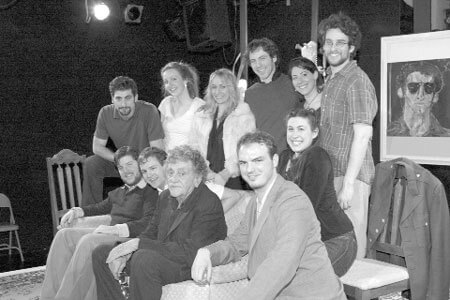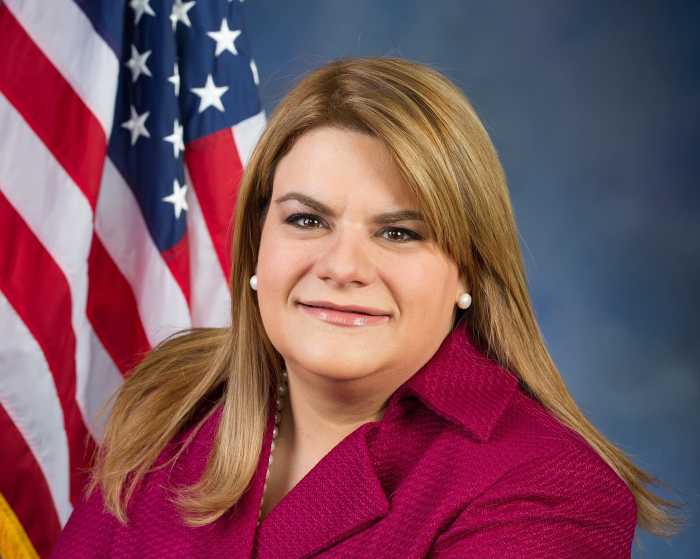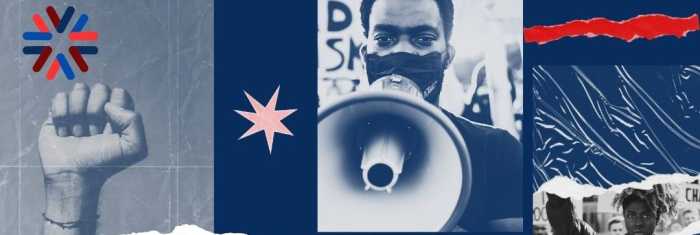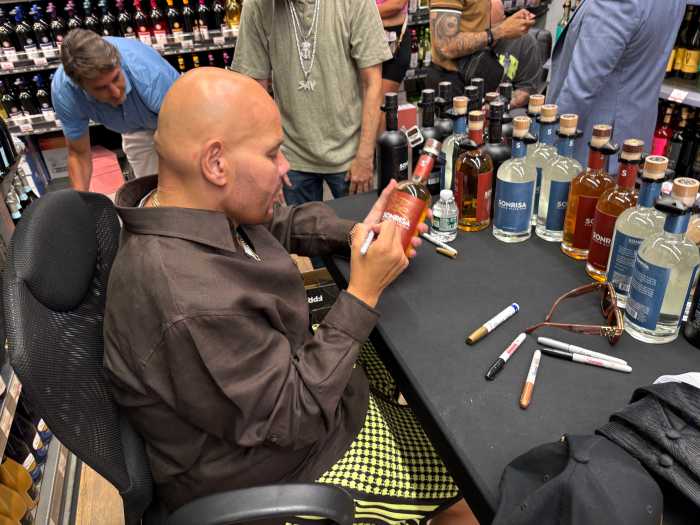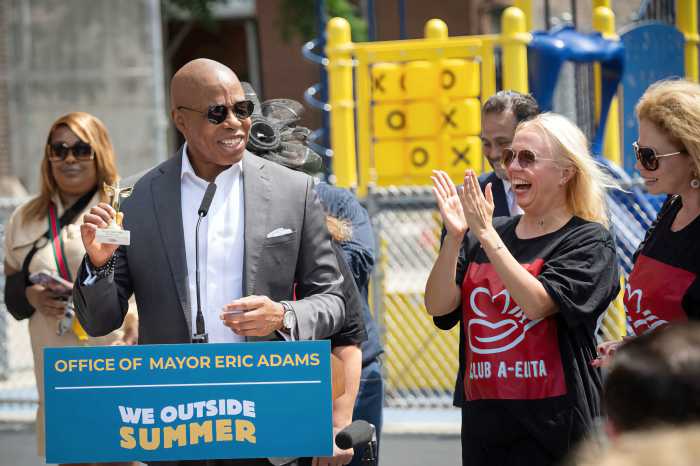As war rages in Iraq, the author’s only theater script resonates deeply
Harold Ryan, who has been off to war for seven years, killing everything in his gun sight just for the hell of it––103 kills by macho Harold’s own count––has come home at long last to his wife Penelope, who is not at all thrilled to see him. Nor are the two suitors who have been hanging around, tongues hanging out: Dr. Norbert Woodly, a peace-loving thoughtful type, and Herb Shuttle, a vacuum-cleaner salesman.
Blustering Harold has brought with him––and is now trying to get rid of––a combat buddy, Colonel Looseleaf Harper, the pilot of the plane that dropped the atom bomb on Nagasaki. Looseleaf’s mother-in-law dropped dead when she opened the door and he said, “Guess who?”
“That’s civilian life for you,” moans traumatized Looseleaf. “Who knows what kills anybody?… First Nagasaki, now this.”
Which will give you an idea of the tenor of “Happy Birthday, Wanda June,” the only play––or in any event the only published play––by Kurt Vonnegut, Jr., the author whose powerful, apocalyptic novels (“Slaughterhouse-5,” “Cat’s Cradle,” “Breakfast of Champions”) have walloped the imaginations of several generations of readers.
“Wanda June” doesn’t often get produced. In 1970, it had a run at the De Lys and Edison theaters until knocked off the boards by a citywide actors’ strike. In 1971, it became a movie––“an awful movie,” Vonnegut said.
But now, and through April 18, it is being performed by a gallant company of quite good actors in the tiny Access Theater on the 4th floor of 380 Broadway, two blocks below Canal Street, and playwright Vonnegut was there to take in the show and afterward answer questions on opening night.
If the name Penelope rings a bell, that’s because it was also the name of the good and faithful wife of Odysseus, who preserved her chastity by sticking to her knitting for all seven years her husband was off helping to topple the towers of Troy, before combating monsters and maidens on the long voyage home.
The sharpest reaction from the audience during “Wanda June” was the gasp/snort at the returning warrior Harold’s line: “Educating a woman is like pouring honey into a fine Swiss watch. Everything stops.”
When Jake Thomas, aka Colonel Looseleaf Harper, led off the questioning by asking Vonnegut “how this play came about, where the idea came from,” the guest of the evening said, well, 40 years ago it had just seemed to him “preposterous . . . ridiculous,” that “Penelope should have no love life” all those years that Odysseus was away.
People used to ask him, Vonnegut said, whether the blowhard, kill-loving Harold Ryan was based on Ernest Hemingway. “My response is that though Hemingway was a bully and a braggart, he only shot one person.” Two beats. “Himself.” To be sure, Vonnegut added, “in ‘The Green Hills of Africa’ he boasts of having shot three lions in one day.”
The Harold Ryan of this production is the energetic James M. Saidy. Penelope is the intense, desirable Shannon Riley. Rachel Slavkin’s direction vaults over limited resources with considerable imagination, though also at utmost decibel count by all concerned.
Suitors Woodly and Shuttle are Daniel Deferrari and Andre Kahri. Brian Hastert has fun with Major Siegried von Konigswald, “the Beast of Jugoslavia.” Charlie Wilson plays Ryan’s unfortunate young son, Liz Parker his even more unfortunate ex-wife. But the most vivid performance of all is by pent-up, fantastic, explosive Jill Frutkin as the 10-year-old Wanda June whose birthday it is as she wanders between the afterlife and life in this hell on earth where one lone package dropped by Looseleaf Harper has wiped out 74,000 people (or maybe twice that) in a flash.
Vonnegut thanked the players for their “charming performance.” He mentioned the stars of the 1970 production––Kevin McCarthy, William Hickey, Marsha Mason (“then unknown”).
In 1970, of course, as well as the few years earlier when Vonnegut must have been writing “Happy Birthday, Wanda June,” the United States was deep in the coils of Vietnam.
“Vietnam was a terrible mistake,” said Vonnegut, noting that one member of the audience––his wife, photographer/ writer Jill Krementz––had done a book about it (“The Face of South Vietnam,” by her and Dean Brelis, 1968). “In the end, we got kicked out.” Short pause. “Never mind where we are now.”
He mentioned Defense Secretary Donald Rumsfeld’s “talk of how ‘Americans don’t have the stomach for casualties’”––citing that remark, though neither Vonnegut nor anyone else in the room could have known that only some hours later the photos of two burned and mutilated American bodies dangling from a bridge in Falluja, Iraq would be on front pages and television screens across the world.
“If you invade someone’s country,” Vonnegut said, “they’re going to fight back. Evidently that wasn’t taught at Yale,” the alma mater of George W. Bush.
In that connection, Vonnegut spoke of having recently seen Tim Robbins’ new play, “Embedded,” which deals with “the gang around the president” but never Dubya himself.
“When asked why not, Tim said: ‘He’s not in the loop.’ That really cleared up any questions I had,” observed Vonnegut, dryly, bringing down the house.
A question from the audience had to do with pilot Looseleaf Harper’s retrospective moment of doubt: What if he had decided, at the last minute, not to drop the bomb on Nagasaki? Vonnegut drew a distinction between Hiroshima (August 6, 1945) and Nagasaki (August 9).
“I think Hiroshima may have had some military meaning,” he said. “I went to Japan with William Styron, who had been a marine in that war. He said: ‘I’d be dead now if there were no atom bomb.’
“But,” Vonnegut continued, “I think the Japanese were ready to surrender after Hiroshima. Nagasaki was to show the Soviets what we could do. It was a human act as vile as slavery.” Pause. “Of course Rumsfeld has stomach for that sort of thing.”
Though he was grateful to see “Happy Birthday, Wanda June” staged again, Vonnegut now “would like to have changed a lot.” “What changes?” director Rachel Chavkin asked. “None of your business,” Vonnegut amiably replied.
He is aware of things in it that are dated––for instance, the character Herb Shuttle, a preeminent square, making good money as a vacuum-cleaner salesman.
“But there was a time, not so long ago, when you could make a lot of money that way. My big brother Bernard put himself partly through M.I.T. as an Electrolux salesman.”
An 18-year-old in the audience, N.Y.U. freshman Justin Levine, asked about the difference between novel writing and playwriting.
“In a book you can put the end of the world in three sentences,” said Vonnegut. “In the theater you can’t have it happen offstage.”
Why had he written no more plays? “Well, for one thing, I began to have a lot of kids.”
Vonnegut seems to think of playwriting itself as a dead end––or at any rate, at a deader end than the collaboratively devised “Law and Order” and other such work he watches on television. “I think that’s the way to go now.”
And with that, he went. And we went. What remains, through April 18, is Wanda June, playing shuffleboard up in heaven with Albert Einstein, Mozart, Lewis Carroll, Jack the Ripper, Walt Disney, Major Siegfried von Konigswald, and Jesus Christ.
Don’t tell Mel Gibson. He might crucify them all.

